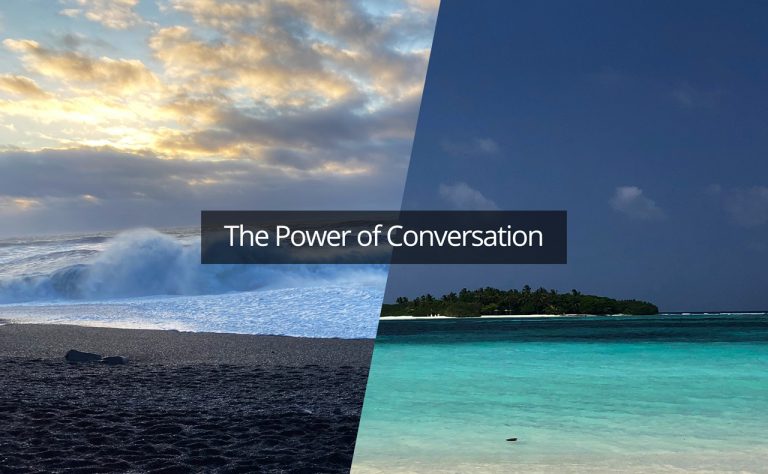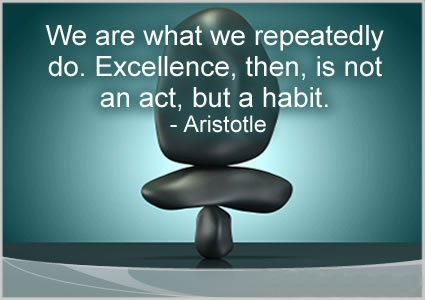An Introduction to Ontological Leadership
Our natural perception of the world and of ourselves is to assume the existence of an objective external world. We live under the assumption that we relate to objects, things, individuals and surroundings whose very meaning; value and existence are independent from ourselves.
Moreover, the traditional concept of human existence leads us to believe that we are essentially rational beings and that we know and understand ourselves in an objective manner. Language arises as a tool which allows us “to grasp” the absolute and true nature of the world around us.
Furthermore, the common conceptual and intellectual tradition has caused us to assume that the essence of things and of our own selves is something “invisible” which is beyond anything we can see or touch. Taken to an extreme, this has led us to split the notion of self from action, body from soul and essence from matter.
This perception is revealed in our daily life in very diverse ways. For example, when we state, “John is honest” or “Mary is not trustworthy” we are operating under the assumption that honesty and trust are features that belong to John or Mary. When we discredit the beliefs of others because of ignorance, lack of scientific knowledge or mental immaturity, we are operating under the assumption that there exists a unique and true reality, which fortunately, has been made known to us. We say to ourselves, “Look at them, they believe the earth is flat”.
In a more familiar context, when we argue with our children or within organizations, we present the final argument, “This should be done, because things are like this.” We demand obedience just because we think we have a privileged access to the true knowledge of reality.
In our personal life we state “I am like this…shy, extroverted, successful, etc.,” and we live with a strong belief that what we say belongs to our permanent and immutable being and cannot, therefore, be changed. We assume that we will always be like that, regardless of the circumstances in which we find ourselves, or the efforts we may make to change them.
This paper, and by extension, TWP programs in general, are an invitation to suspend, temporarily, your habitual way of being in the world and of understanding yourself. This invitation arises from a conviction that the changes taking place in our daily lives are causing a shift in the historical paradigm in which we are immersed. The globalization of information and knowledge has begun to challenge our traditional convictions; the changes we are experiencing in the areas of business and technology challenge our ability to perform well and our ability to innovate; the environmental crisis causes us to question our way of life.
In this paper, we ask you to consider that we live in interpretive worlds, that our reality is constructed on the basis of a set of beliefs, paradigms and master assessments. In addition, we also ask you to consider the idea that a human being is a complex interaction between body, emotion and language and that through language we not only describe the world but we also generate new realities and possibilities.
WE LIVE IN INTERPRETIVE WORLDS
Beyond what the world may or may not be, it is possible to observe that organizations, families and individuals live within a set of interpretations, beliefs or paradigms that, for them, constitutes reality itself. The paradigms, or master assessments, on which an organization is sustained determine “what we are” and “what is meaningful for our company.”
At previous times in history, the majority of human beings believed that the Earth was flat; and that the Earth was the centre of the universe.
Similarly, an organization might operate under the assumption that some things will never be feasible and that they will always be the market leaders; or a person can live in a world in which nothing or nobody can be trusted. Each is a particular interpretation.
The beliefs or master assessments that make up the world for a given organization, family or individual are not experienced by its members as “ideas” that people have about the world, but as reality itself. In our previous illustration, a distrustful person simply feels the world is cheating or attacking him/her. From a different perspective, we may express what was said about our beliefs in this way: “We do not own them, they own us.”
For us to acknowledge that we live in interpretive worlds, we must also question our traditional way of understanding the concept of truth. We can say that for medieval people it is “evident” that the sun turns around the Earth. From this new perspective, we can observe that we speak of “truth” when our assertions suit the set of beliefs that constitute the culture of the organization or family but not necessarily when they suit reality itself.
Ultimately, we do not know how things really are; we can only say how we observe or interpret them.
A large part of any TWP program consists of noticing and “extending” your interpretation of the world since your current interpretations are the ones that limit your possibilities.
Because of this, you can expect that the trainers and coaches will not “buy” your interpretations of your experiences but will help you explore them.
EVERYTHING THAT IS SAID IS ALWAYS SAID BY SOMEBODY
One of the most remarkable consequences of admitting that we do live in interpretive worlds is that the type of world we live in reveals the type of being we are. Everything we do or say reveals the type of person we are when we say what we say or we do what we do. For example, whoever sees constant threats in the world, bad intentions or tragedies, reveals an attitude of distrust. In an organization, the person who always says “We’ll never be able to do it” or “Yes, it’s interesting, but can we do it?” reveals a resignation toward the future.
The above has been stated by Humberto Maturana in two aphorisms: “Everything we say in relation to what we observe (the world) reveals the kind of observer we are” and “Everything that is said is always said by somebody.”
Another consequence of admitting that we live in interpretive worlds is to observe that every belief, assessment or action regarding the world, or ourselves, opens a horizon of possible actions and closes others. Ultimately, it brings a world within reach.
Let’s examine this situation. All of us have probably gone through the experience of fixing an object. Let’s say some piece is missing. Our surroundings immediately turn into an instrumental world, a wire can become useful to fix the engine, a chair can become a step stool and a knife works as a screwdriver. Our technical concern or breakdown gives rise to a world of tools.
The world of possibilities looks so different when we say, “I’ll never be able to learn Spanish because I’m hopeless at languages,” versus “Learning Spanish is hard for me,” versus “I need help to learn this.” The first declaration generates no possibilities for learning while the second opens up the possibility, and the third opens up a supporting network.
From an attitude of distrust, the possible actions are to defend one’s self, take precautions to remain secure, or isolate one’s self. From an attitude of boredom, the world looks dull and restricted in action; with motivation, the future looks challenging.
In short, we believe that the position or perspective from which we observe and live the world, or interpret ourselves, determines our possibilities for action.
An important question therefore becomes “What criterion do we use to evaluate or to decide between one interpretation or another?” At a pragmatic level, we believe in using
criteria that allow us to choose from different interpretations and to observe the possibilities for action and well being available given different beliefs, assessments or explanations.
For example, the declaration “I’ll never be able to do it,” reveals resignation about the future and will permanently maintain the ineffectiveness and suffering caused by our inability to carry out what we wish. The declaration “I need help to undertake this job” opens a future of possibilities and learning opportunities and offers the possibility to put an end to the dissatisfaction caused by the situation.
Therefore, learning to observe the power for action and well being generated by the different interpretations available to us becomes a great tool for personal and professional change and for leadership within organizations.
All of us have developed excellent interpretations and explanations for the situations we are in. However, when they are examined from the standpoint of generating powerful action or a sense of well-being, we often realize that our explanations keep us where we are or that they perpetuate continued frustration.
One aim of TWP programs is to foster the possibility of new interpretations for you – to provide you with a greater power to act and generate greater leadership and, ultimately results.
BODY, EMOTION AND LANGUAGE
The priority given to reason in modern times has almost cast our body and emotions into oblivion. Our “common sense” thinking has us view the body as a “wrapping,” which contains our true self and has us view emotions as that which alters or modifies our correct way of thinking, deciding, and assessing.
In contrast, TWP programs offer you the opportunity to see any situation you find yourself in as a catalyst in you that generates a particular kind of coherence of body, emotions and language.
Although this may seem obvious, our body position always relates to our specific mood, and we live in a world of possible conversations or interpretations that is coherent with that mood and body position.
For example, when we are happy, the body expands and our interpretations about the future are full of possibilities. When we are sad, the body shrinks and the future is influenced by the loss of something we value. It may seem strange, but in our daily life we often take into account the coherence of emotion, body and language. For example, when we enter a meeting room and quickly glance at the tense bodies and tight faces of
the participants, we sense the presence of conflict at the meeting and automatically know the type of conversations that are likely to occur.
When we arrive home and say hello, the mere tone of our partner’s or kids’ answer gives us a hint of the moods they are in, and the type of conversations which are likely to occur or not occur in that emotional atmosphere.
When we watch people from a distance, moving their hands and body in different conversations or just walking along the streets, we can infer a certain emotion and a possible range of conversations.
Many of our attempts at personal and organizational development have been frustrated by thinking that having a clear notion about the necessity of change will be enough for the change to occur. Only to discover later that the mere declaration is not enough to create what we wish, whether it is to quit smoking, to exert authority, to learn to trust, or to adapt to changes. Change requires more than declarations.
The ability to observe the coherence between body, emotion and language opens an immense field for effective learning because we can design learning opportunities involving the three areas of our own coherence. Sometimes, our difficulty to trust or exert authority is related to our habitual failure to develop an appropriate body posture. This difficulty can also be related to our lack of expertise in producing the emotions or conversations that may make learning possible.
In brief, the type of observer we are when we look at the world and ourselves is a function of the body, emotional, and linguistic predisposition in which we find ourselves.
In TWP programs, one of the key capacities you can explore and develop is to see the body as a declarative space: What is my body telling me? What incoherence do I observe between what I am saying and how I am moving? What shifts in my movement might give rise to new conversations, and ultimately actions and results?
LANGUAGE IS ACTION
Language is generally seen as passive. A describer of the outer, as well as the inner, reality. Assertions such as “This is a forest,” “John is honest,” “I am responsible” seem to describe properties inherent in the things we name. Language is a “code” used to describe the world that already exists.
In TWP programs we explore the idea that language is not only descriptive but also generative and that when we speak, think or communicate with others, we are not only describing reality but we are also causing things to happen or not happen; we create realities that would have never existed without our conversations. In brief, language not only describes the world but it also generates a world.
For example, a new world emerges when a couple becomes engaged, when a judge pronounces a sentence, when a referee calls a penalty, a father declares his love for his child, and when the manager hires, fires or acknowledges an employee. Something new is created when we forgive, when we commit ourselves to accomplish a new task or when a new product is offered in the market. In all these cases, a new reality has been generated with our conversation. This modifies our identity and our possibilities for action in the world.
If I commit myself to finish a document by a certain date, my schedule is affected, my professional identity is at stake and the other person may take on commitments with third parties based on my delivery date. When we forgive, we are putting an end to a conflict that took up our time and energy for a while and we are opening a world of new possible actions with the other person.
LEADERSHIP FLOW
In TWP programs we work with the idea that we cannot know exactly how things are; we can only say how we observe them. In other words, there is always a distance or difference between the interpretation we have of reality and reality itself.
However effective this interpretation may be to explain our experience, there are also occasions when people create a full “merging” with the world – being “in the flow”, or in sports you often hear the term “in the zone”
We can see this happening when the orchestra conductor is carried away by the music; when the footballer, without thinking, suddenly arrives at the right place at the right time; when the leader of an organization instinctively uses the right words to engage their team; or when the professional “merges” with the task he or she is doing. If we carefully observe these “moments of mastery” we notice that the individual is not thinking “How am I doing it?” “Where do I have to move?” “What do I have to say?” “What will they say?” they simply become the action of saying or doing.
Furthermore, the words, actions and movements they perform do not arise from their “reflective-self” but from the very “dance of life” in which they are engaged.







